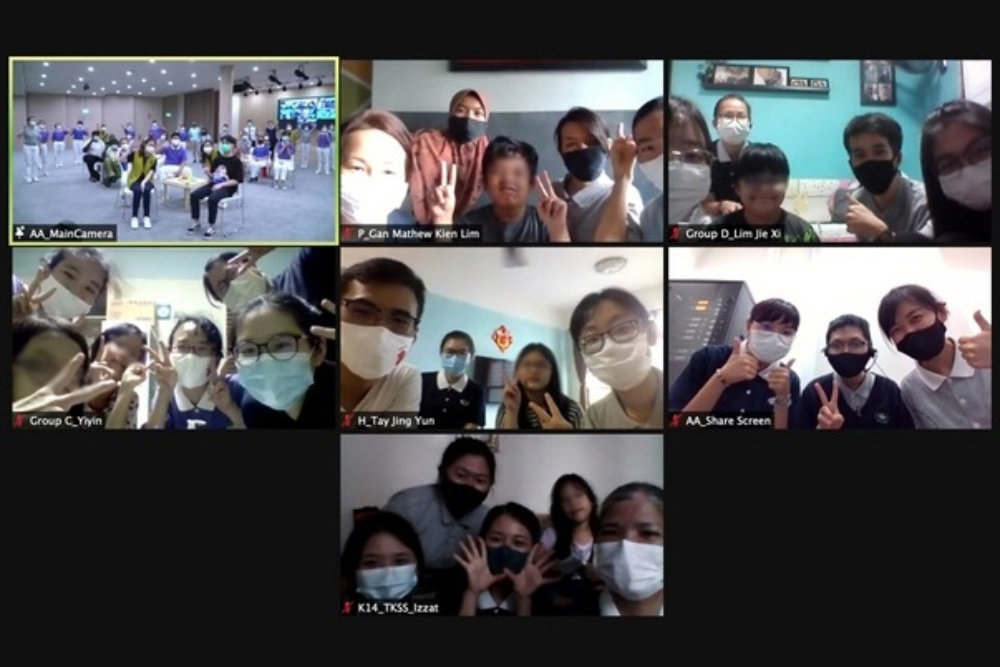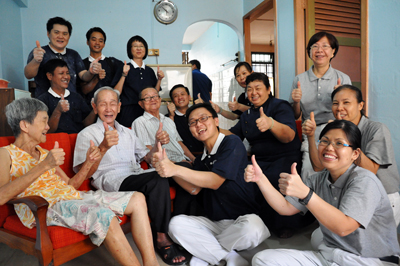 Participants responding to the speaker’s question during the first segment of the training session
Participants responding to the speaker’s question during the first segment of the training session
“It is us who should thank them (the aid recipients),” said the emcee of Tzu Chi Singapore’s English Volunteer Training Session, Brother Bernard Beh, as he explained how Tzu Chi volunteers are taught to be grateful to the people they help.
Themed “Mission of Charity”, the training session was held on 22 July 2018 at the Tzu Chi Jing Si Hall in Pasir Ris. It saw the attendance of 31 participants, out of which around 10 are first-timers. A few non-Chinese participants from overseas were also sighted.
The Tzu Chi Foundation, which originated from Taiwan, has now evolved into a global NGO with offices worldwide. As the predominant lingua franca in the organisation is Chinese, Tzu Chi Singapore specially organises three English Volunteer Training sessions annually, to reach out to English-speaking and non-Chinese members of the public. This training session was the second held this year.

Uta (in a peach-coloured blouse), who hails from Germany, has worked as an alternative medicine practitioner in Singapore for three years. She first got connected with Tzu Chi in Batu Pahat, Malaysia, and now hopes to contribute to Tzu Chi’s Mission of Medicine in Singapore.
“Kindness Boomerang”
The training session began with Tzu Chi volunteer leader Brother Lim Chin Chean sharing what inspired Dharma Master Cheng Yen to establish Tzu Chi: Over 50 years ago, while practising spiritual cultivation alone in a small wooden hut in the impoverished rural east coast of Taiwan, Master Cheng Yen was visited by three Catholic nuns one day. The nuns spoke of the charitable work the Catholic Mission had done for the destitute, and commented why Buddhists were seldom seen contributing to society. Their words struck a deep chord with the Master, and the conversation was one of the primary impetuses that spurred her to set up Tzu Chi, with the aim of combining the efforts of individuals to help the poor and the sick.
Brother Lim also played a video titled “Kindness Boomerang”, which depicted how one’s kindness could be passed on to people whom one has never met and may never meet in one’s lifetime, and how it would eventually find its way back. Then, he gave an introduction to the various charitable programmes of Tzu Chi Singapore, and also highlighted some of the unique characteristics of the Foundation’s Mission of Charity. One of these characteristics is to provide assistance directly to those in need, where volunteers get into direct contact with the aid recipients, instead of simply donating money or aid to another charitable organisation.
“In Tzu Chi, we call those that we help ‘Households of Gratitude’. Who should be grateful to whom—the recipients to the volunteers, or the volunteers to the recipients?” Lim asked the participants.
The answer is—both parties.
Tzu Chi volunteers are taught to be grateful to the people they help, because witnessing the suffering of the latter reminds them to count their own blessings and helps to nurture compassion in them. It constantly reminds them of the impermanent nature of life and how blessed they are to be able to give.
An eye-opening talk on providing humanitarian aid overseas
The participants had a short break before veteran Tzu Chi volunteer Sister Lim Chwee Lian gave a talk about Tzu Chi’s Mission of International Relief. An important aspect of the Mission of Charity, a Tzu Chi humanitarian aid mission abides by the five key principles of timeliness, directness, priority, respect and gratitude, and practicality.
Sister Lim shared about Tzu Chi’s relief efforts in Tacloban City of the Philippines in the aftermath of Super Typhoon Yolanda in 2013, and how Tzu Chi volunteers’ unwavering spirit of Great Love changed the lives of the people in the city. The local government had initially planned to abandon the city, which was devastated by a storm surge when the typhoon struck. But through implementing a cash-for-work relief programme, Tzu Chi Philippines helped tens of thousands of local residents rebuild their homes and livelihoods, thus bringing a new lease of life to the city.
 Sister Lim Chwee Lian shares about Tzu Chi’s Mission of International Relief and her active involvement in humanitarian aid work in post-tsunami Sri Lanka.
Sister Lim Chwee Lian shares about Tzu Chi’s Mission of International Relief and her active involvement in humanitarian aid work in post-tsunami Sri Lanka.
Sister Lim’s inspiring talk was unfortunately disrupted by a faulty projector, when the screen started to blackout intermittently while displaying the PowerPoint slides and videos which everyone had their eyes locked to. However, the glitch did not deter the audience from focusing on what she was sharing.
Lim also spoke of her personal experiences involving in Tzu Chi’s humanitarian aid work in post-tsunami Sri Lanka, where she has visited more than 50 times. Once, she and her team of volunteers encountered many difficult challenges while attempting to distribute a shipment of multipurpose foldable beds to disaster victims in the country. But through her unwavering sincerity and assiduous efforts, she was able to overcome the obstacles one by one, with the support and help of the locals.
A plump and jolly middle-aged lady, Lim jokingly commented that even though she had worked very hard during the relief missions, she had never slimmed down a bit. Her humorous remark sent everyone laughing heartily.
After the talk, the attendees had a 30-minute group discussion, where each group was guided by a group leader, to share their thoughts on the Mission of Charity, including their experiences in charity work and how Tzu Chi’s values and spirit inspired their efforts. The group leaders, who were mostly certified Tzu Chi commissioners, actively engaged everyone in the discussion, and took the lead to share their own personal experiences and takeaways.
 Group members and their table leaders sharing their thoughts about and experiences with Tzu Chi’s Mission of Charity during the 30-minute discussion session.
Group members and their table leaders sharing their thoughts about and experiences with Tzu Chi’s Mission of Charity during the 30-minute discussion session.
After the group discussion session, another experienced Tzu Chi volunteer, Brother Chew Sio Peng, spoke on the topic of Tzu Chi’s etiquette. In his talk, Chew patiently explained to the participants the correct ways to pay respects to the Buddha and Sangha as well as the protocols that Tzu Chi volunteers follow, with an emphasis on the cultivation of a refined demeanor.
 Participants learning how to make the “Lotus Bud” mudra with their hands
Participants learning how to make the “Lotus Bud” mudra with their hands
Next, Dr. Ho Xin Qin, a young doctor and table leader, and two other volunteers led everyone through the sign language song, “The Spirit of Great Love”. After just one demonstration by the team, the participants readily picked up the simple gestures and movements. They were happy to move and relax their bodies and limbs after being in a sedentary position for some time.
Inspiration and takeaways from the training session
“I have heard about Tzu Chi and read about it online, and I learned that it caters for more than just Buddhists. I’m a Hindu, and we don’t have a Tzu Chi office in India yet. (I hope to bring back what I have learned here) and start one in the future,” said Shravya, a participant who is a 4th year university student from Bangalore, India.
 Shravya (in a pink blouse), a 21-year-old university student, came to Singapore all the way from Bangalore to learn about Tzu Chi’s Missions.
Shravya (in a pink blouse), a 21-year-old university student, came to Singapore all the way from Bangalore to learn about Tzu Chi’s Missions.
“The session is very meaningful and very informative. I get to know more about Tzu Chi here,” said Win Moh Moh, Vice Principle of Tzu Chi Great Love PreSchool. Moh Moh, who hails from Myanmar, came for the training session after learning about it from the Head of Education Services of Tzu Chi Singapore. She was seen jotting down notes throughout the training session and hoped to serve as a Tzu Chi volunteer someday in the future.
 Win Moh Moh, who hails from Myanmar, attentively takes down notes of what she has learned during the training.
Win Moh Moh, who hails from Myanmar, attentively takes down notes of what she has learned during the training.
“Repetition is the key to learning… Attending the training sessions reinforces what I have already learned previously. Although the same theme would be repeated (each year), we have different speakers sharing their knowledge and experiences (with the attendees in each session),” said Dr. Ho Eu Chin, an ENT Specialist and one of the coordinators cum table leader of the event. He had participated in the volunteer training sessions for close to 10 times since 2014, and highlighted that attending the classes each year was about learning new things from different people.
 Dr. Ho Eu Chin (in the middle), a table leader and the co-coordinator for the English Volunteer Training session, felt happy and inspired to learn from a different group of people each time he attended the training.
Dr. Ho Eu Chin (in the middle), a table leader and the co-coordinator for the English Volunteer Training session, felt happy and inspired to learn from a different group of people each time he attended the training.
Words from the Deputy CEO
In his closing speech, Tzu Chi Singapore’s Deputy CEO, Khoo Kean Yee, stressed that Tzu Chi’s philosophy is not just about providing help to the poor and sick, but also about learning from people who are suffering and to be grateful for what we have in life. He also encouraged the participants to invite their friends and families to join Tzu Chi’s activities to get to know more about the organisation.
Tzu Chi’s in-depth philosophy of charity and the strong unity of its volunteers make the organisation stand out from other charity groups. Apart from being given ample opportunities to help the poor and needy, volunteers are taught not to neglect their spiritual cultivation while serving others. This is why Dharma Master Cheng Yen always reminds everyone to be more mindful while doing work, and to never forget to nurture our wisdom when volunteering in Tzu Chi.



